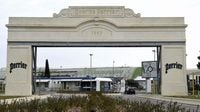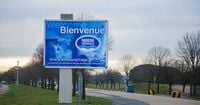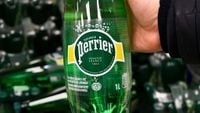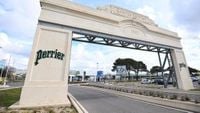In a shocking development for the Perrier brand, new contamination issues have emerged from its factory in Vergèze, Gard, prompting health authorities to recommend the withdrawal of its "natural mineral water" label. The revelations come from an ongoing investigation by Radio France and Le Monde, which has been scrutinizing the practices of Nestlé, the parent company of Perrier, for over a year.
On April 18, 2025, it was reported that pathogenic intestinal bacteria, specifically enterobacteria, were found in 75 centiliter bottles produced at the site. This contamination has led to the shutdown of a production line and the blocking of approximately 300,000 bottles, as confirmed by a document from the Occitanie Regional Health Agency (ARS).
The situation is dire, with hundreds of thousands of additional 50 centiliter bottles also being blocked due to the presence of excessive revivable germs, which are potential indicators of bacterial contamination. According to the ARS, "complete destruction could be considered" for these bottles.
Despite the severity of the findings, Nestlé has attempted to downplay the situation, stating that the blocked products are simply part of "internal quality management measures independent of the water quality at the well" and assuring the public that "all products placed on the market are safe." However, the company's lack of immediate transparency has raised questions.
Compounding the issue, Nestlé failed to notify health authorities in a timely manner, as required by the public health code. The presence of enterobacteria was detected on March 11, 2025, but the ARS was only informed ten days later. Similarly, non-compliance for the 50 centiliter bottles was detected on March 22 but was not reported until April 4, 2025.
The timing of these revelations is particularly critical, as Jérôme Bonet, the prefect of Gard, is expected to make a decision regarding the future of the Perrier brand based on the ARS's report. The director-general of the ARS has recommended that production of natural mineral water at the Vergèze site be halted, which could lead to the "pure and simple disappearance" of the iconic sparkling water brand.
Health experts have long warned that the water resources exploited by Nestlé in Gard have not been pure for years and should not be marketed as natural mineral water. A recent report from hydrogeologists confirmed that all Perrier boreholes have lost their "original purity," which is a necessary condition for the appellation. This finding aligns with earlier investigations that highlighted discrepancies between the water quality analyses conducted by Nestlé and those performed by health authorities.
Furthermore, the filters employed at the factory, designed to disinfect polluted water, have been criticized for their inefficacy. These 0.2 micron filters cannot adequately filter out all viruses and may allow certain bacteria to pass through, which could explain the recent contamination episodes. This issue has been known to authorities since at least 2021, and yet Nestlé was granted permission to continue using these filters by the government in February 2023.
The ongoing scandal has prompted the fraud squad (DGCCRF) to take legal action against practices that may constitute criminal offenses at the Vergèze factory. The agency has been aware of the situation since 2021 and has recently escalated its investigation into the matter.
As the situation unfolds, local officials and residents are growing increasingly concerned about the potential economic fallout from the factory's closure. The Vergèze site employs around 1,000 people, and any decision to halt production could have disastrous consequences for the local economy.
In light of these developments, the prefecture of Gard has yet to issue an official response, but the urgency of the situation is palpable. The future of Perrier hangs in the balance as authorities weigh public health concerns against the economic implications of shutting down one of France's most beloved brands.
The Perrier scandal is a stark reminder of the importance of transparency and accountability in the food and beverage industry. As consumers become more aware of the potential risks associated with contaminated products, companies like Nestlé must prioritize public safety over profits. The coming days will be crucial in determining the fate of Perrier and the integrity of its brand.





